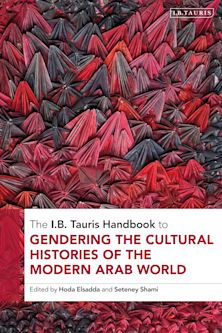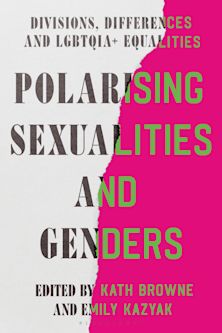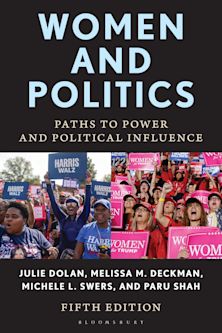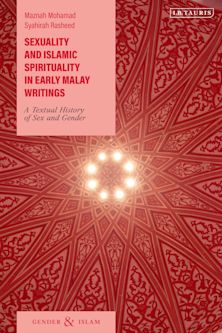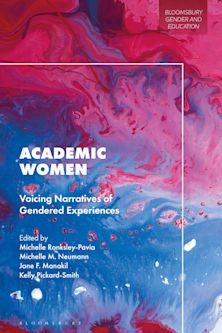- Home
- ACADEMIC
- Politics & International Relations
- Sexuality and Gender
- Global Women Leaders
Global Women Leaders
Studies in Feminist Political Rhetoric
Michele Lockhart (Anthology Editor) , Kathleen Mollick (Anthology Editor) , William Carney (Contributor) , Charlotte Evans (Contributor) , Valerie M. Hennings (Contributor) , Nicole Khoury (Contributor) , Janet M. Martin (Contributor) , Kathleen Mollick (Contributor) , Catherine Waithera Mwangi (Contributor) , Oscar Gakuo Mwangi (Contributor) , Mohanalakshmi Rajakumar (Contributor) , Laura Steckman (Contributor) , Joy Williams-Black (Contributor)
Global Women Leaders
Studies in Feminist Political Rhetoric
Michele Lockhart (Anthology Editor) , Kathleen Mollick (Anthology Editor) , William Carney (Contributor) , Charlotte Evans (Contributor) , Valerie M. Hennings (Contributor) , Nicole Khoury (Contributor) , Janet M. Martin (Contributor) , Kathleen Mollick (Contributor) , Catherine Waithera Mwangi (Contributor) , Oscar Gakuo Mwangi (Contributor) , Mohanalakshmi Rajakumar (Contributor) , Laura Steckman (Contributor) , Joy Williams-Black (Contributor)
You must sign in to add this item to your wishlist. Please sign in or create an account
Description
Global Women Leaders: Studies in Feminist Political Rhetoric demonstrates the ways in which women have used political rhetoric and political discourse to provide leadership, or assert their right to leadership, on a global level. This collection fits into the robust research area of international political women and their use of language in gaining and maintaining political power. It casts a wider net in terms of discussing women’s efforts to assert and preserve their roles of authority, particularly when their audiences may perceive their authority as illegitimate due to gender. Chapters dedicated to Elizabeth II and Sheikha Moza Bint Nasser discuss the more traditional ways in which women leaders use language to construct political power. Other chapters focus on women who serve as political activists, either individually or as part of a group, including Aasma Mahfouz of the Egyptian Revolution of 2011 and the women who help direct United Nations policy through their speeches in the General Assembly. Global Women Leaders will appeal to scholars of political communication and international rhetoric.
Table of Contents
Part I: The Elizabeths: Women and Leadership in the United Kingdom
Chapter 1: “The Heart of a King”: Gender Components Affecting the Leadership and Political Rhetoric of Elizabeth I, Charlotte Evans
Chapter 2:Queen Elizabeth II and Princess Diana: Saving the Monarchy, Kathleen Mollick
Part II: Maathai, Ogot, and Ngilu: Women and Leadership in Kenya
Chapter 3: Environmental Conservation, Peace, Democracy, and Development: A Case Study of Wangari Maathai’s Speeches, Catherine Waithera Mwangi and Oscar Gakuo Mwangi
Chapter 4: The “Extension of Self in Service”: An Analysis of Female Kenyan Political Leaders, Joy Williams-Black
Part III: When Nations Unite: A Global Community of Female Leaders in the United Nations
Chapter 5: Women’s Rhetorical Leadership within the United Nations, Valerie M. Hennings and Laura Steckman
Chapter 6: Samantha Power: Before and After “Hell”, William Carney
Part IV: Global Figures: Social Issues and Social Media
Chapter 7: Assessing the Rhetoric of Sheikha Moza: Mistress of Ethos, Mohanalakshmi Rajakumar
Chapter 8: Religiously Gendered: Online Political Discourse in the 2011 Egyptian Revolution, Nicole Khoury
Product details
| Published | Sep 24 2014 |
|---|---|
| Format | Ebook (PDF) |
| Edition | 1st |
| Extent | 198 |
| ISBN | 9798216309888 |
| Imprint | Lexington Books |
| Illustrations | 4 Tables |
| Publisher | Bloomsbury Publishing |
About the contributors
Reviews
-
Global Women Leaders is an important first step in developing our understanding of how female leaders use language and rhetoric to enhance their political authority and influence within different cultural, religious, and historical contexts. The authors of this collection address an important gap in the literature by bringing together feminist scholarship with leadership studies and rhetorical discourse analysis to examine a range of women leaders from the United Kingdom to Kenya to those operating at regional and global levels. This convergence of approaches is increasingly critical as more and more women rise to leadership positions and strategically use language to empower themselves and the communities that they seek to represent. This volume should encourage more research on the agency of these powerful women and the political decisions that they make about using language as a leadership tool.
Natalie Hudson, University of Dayton
-
With its eclectic, global perspective, this collection of essays makes important contributions to our understanding of the intersections of gender, political rhetoric, and culture. Each chapter offers a compelling portrait of the rhetorical strategies and leadership styles employed by a diverse group of international women politicians and activists. It will appeal to students and scholars interested in understanding the public performances of women leaders from around the world.
Diane M. Blair, California State University, Fresno












